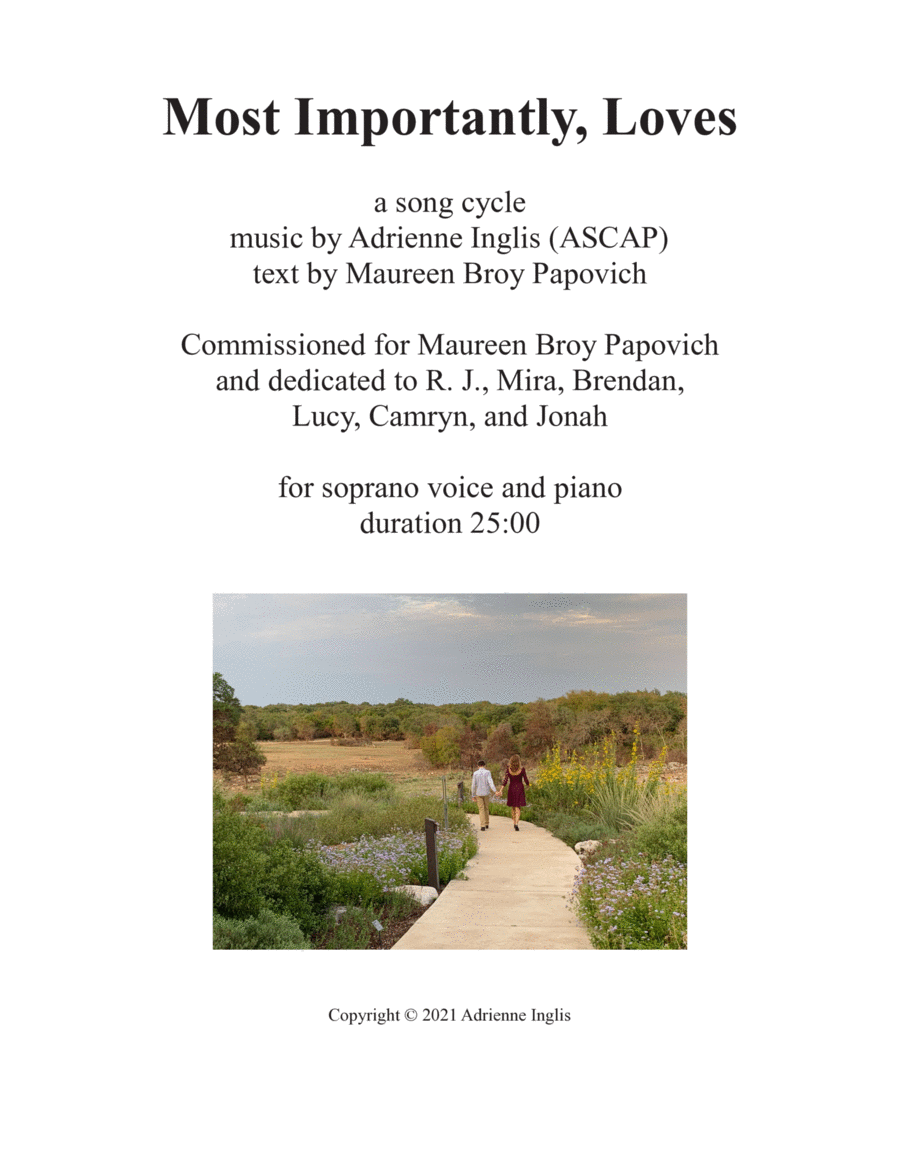Piano,Vocal,Voice - Level 4 - Digital Download SKU: A0.1233352 Composed by Adrienne Inglis (ASCAP). 21st Century,Classical,Country,Pop. Score. 45 pages. Adrienne Inglis (ASCAP) #828940. Published by Adrienne Inglis (ASCAP) (A0.1233352). Sing one, two, or all six of these expressive and charming songs for soprano and piano!Most Importantly, Loves (2021) by Adrienne Inglis (ASCAP), as a six-song cycle for soprano and pianoText — six letters by Maureen Broy PapovichDuration 25:00Difficulty 4 intermediate/advancedProgram note — Most Importantly, Loves (2021), a song cycle for soprano and piano composed by Adrienne Inglis (ASCAP), was commissioned by Maureen Broy Papovich whose six letters furnish the text. She wrote letters to various close family members with tender messages overflowing with admiration, affection, and hope. The songs look at each beloved relative as seen through the prism of the author’s caring eyes and heart. Rooted in moody Dorian mode, the lyrical melodies of R. J. overlay a more brooding, restless piano part. Lucy sports a bit of a jazzy lilt and sassy attitude. The infectious laugh of Camryn and the remarkable resemblance to her late father underpin this quick syncopated C major number. Brendan reflects his exuberant love of life and devastating self-destructive addiction with radical tonality and tempo changes. Mira has an encouraging message for a young person in D mixolydian with soothing piano texture. Jonah’s long lines soar over lush expansive harmonies grounded in B flat major to form a soft fleece blanket of comforting sound and boundless unconditional parental love. — Adrienne InglisThe impetus for the poems that became the song cycle “Most Importantly Loves” started a decade ago. My brother died suddenly in 2011 at the age of 42. He left all of us behind including his daughters, my nieces, when they were ages six years and six months. My father and mother died a short time later, within months of each other in 2013 and 2014. Finally, in 2017 my 27-year-old nephew died of a drug overdose. This intense period of loss brought and continues to bring about many feelings of regret in addition to so much more. When my nephew died, my son Jonah, developed an intense anxiety about losing us, his parents. I felt compelled to express my feelings, the fear of my own mortality, the anxiety of leaving behind loved ones, combined with words said and unsaid to those lost. “Love letters” is my gift to the six young people I care most about. These songs, exquisitely set to music by my friend and composer Adrienne Inglis, express my deep love for each of my loved ones and also, hopefully, provide them with a piece of writing that they can use as a source of strength when life becomes particularly challenging. —  Maureen Broy PapovichPlaylist of Oct. 22, 2022 performance:https://youtube.com/playlist?list=PLY9Jh0jT7VQsLBdIik5wJRjE6Qhu_5IZD.
